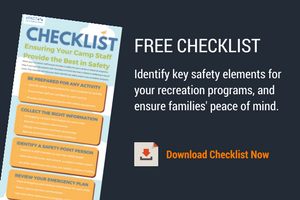Running a summer camp or program is a tough job! Besides the obvious tasks, you and your team are also responsible for providing a safe and secure environment for campers of all ages, participating in a wide variety of activities. Here are 3 easy safety tips to help:
1) Be Prepared for All Activities
Your camp or summer program likely offers a variety of activities for participants, ranging from swimming and hiking to archery and crafts. As you plan each activity identify any safety requirements unique to it. Ensure that accredited bodies certify your instructors for each activity and that they have any necessary safety equipment available to them. Here are some safety recommendations for some popular camp activities as well:
- Field Trips – The field trip is often both the most anticipated activity for campers, and the most dreaded by camp staff. Preparation is key! Make sure that that you have access to crucial medical and contact info for all campers (this is were the ePACT app is handy!) and check that you have the necessary medications or health equipment before leaving. For any activity, whether it be a petting farm or rock climbing, ensure the campers are aware of the safety rules for that site and know what to do if they get lost or hurt.
- Hiking – Hiking is always a fun way for your camp participants to explore sites. This Hiking Guide for Beginner Hikers offers basic hiking tips: know where you are going and take the necessary gear, including a compass, food and water, and a simplified first aid kit.
- Campfires – Who doesn’t love roasting s’mores on a bonfire? Just be sure to set expectations with your participants. They should never run near a campfire, attempt to touch the fire or wood, or wear loose, dangling clothing. Younger campers should always know the 3 step rule- “if on your face you feel the heat, 3 steps you must retreat!”
 2) Appoint a Safety Captain
2) Appoint a Safety Captain
It’s critical to identify a staff member as a safety expert. This individual can help create a culture of safety, while also focusing on safety in these key areas:
- Kitchen and food services
- Health and sanitation
- Emergency preparation and management
- Transportation and travel supervision
- Latest activities programs and safety issues
Having a safety captain accountable ensures that key tasks will be completed, while also providing a point person for other camp employees to connect with on all matters of safety.
3) Review your Emergency Plan
No one likes to think of emergencies, but they do happen and being ready is key to reducing the impact.. First of all, make sure your have emergency information for all campers and that it’s easily accessible. Using a tool like ePACT is great, but also plan for other contingencies too. Have electronic or paper back-ups you can also go to if you don’t have access to a mobile device.
In addition to having current medical and contact information your camp, be sure to have a way to quickly communicate with all parents, guardians and emergency contacts in the event of an emergency. If you rely on phone calls, you could have to call three or four people for each camper before reaching someone! Testing your emergency communications plan can help you identify gaps and determine solutions before an unexpected event.
The safety of your participants is top of mind as you plan and organize your summer activities, and we hope these three tips will help you and your team have a great safe summer!

Terms and Conditions
All content provided on this blog is for informational purposes only. The owner of this blog makes no representations as to the accuracy or completeness of any information on this site or found by following any link on this site. The owner will not be liable for any errors or omissions in this information nor for the availability of this information. The owner will not be liable for any losses, injuries, or damages from the display or use of this information.
This policy is subject to change at anytime.
